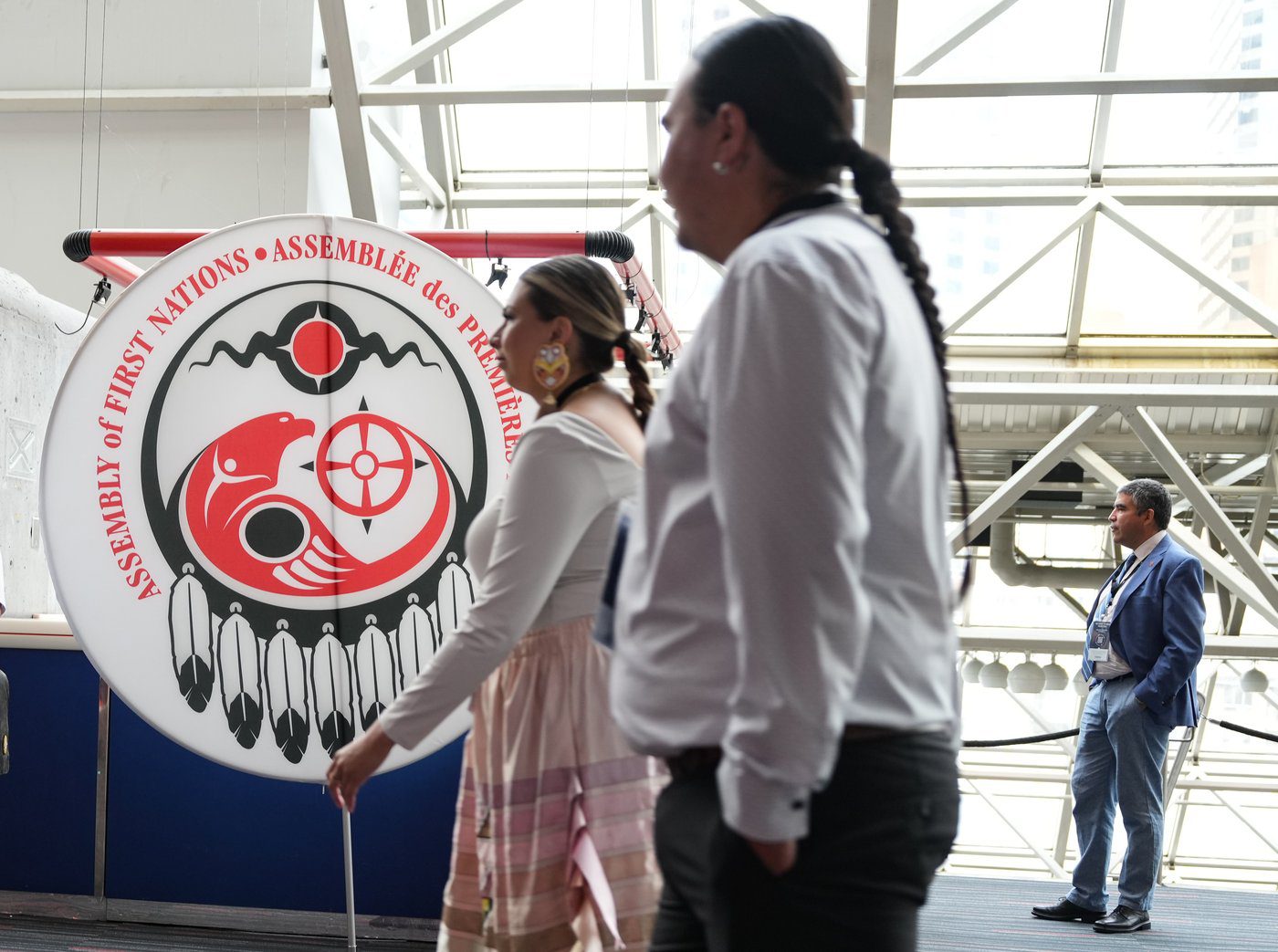OTTAWA — Hundreds of First Nations chiefs are gathering in Ottawa for three days this week to discuss economic reconciliation, reforming the First Nations child welfare system, the policing system and the carbon price at an Assembly of First Nations’ special chiefs assembly.
The gathering comes after a testy October assembly that saw chiefs vote down a $47.8-billion child welfare reform deal with Canada after decades of legal fights that found the federal government discriminated against First Nations children.
It also comes as chiefs grow increasingly worried about a change in government, with a federal election looming and a gridlocked Parliament that means key pieces of legislation for First Nations people are not moving forward.
The assembly’s gatherings are often attended by federal politicians, including Prime Minister Justin Trudeau, whose address is set for Thursday according to a draft agenda.
Conservative Leader Pierre Poilievre is not expected to be in attendance. His wife, Anaida, will speak on a panel about human trafficking on Wednesday.
AFN National Chief Cindy Woodhouse Nepinak said in an interview the organization will continue to invite Poilievre to address chiefs, and that he can hopefully join them for discussions at the next assembly.
Poilievre addressed the AFN at its annual general assembly in July, the first time he spoke to the assembly since he was named party leader.
NDP Leader Jagmeet Singh and Bloc Québécois Leader Yves-Francois Blanchet are scheduled to address the assembly Thursday, followed by Justice Minister Arif Virani, Crown-Indigenous Relations Minister Gary Anandasangaree and Indigenous Services Minister Patty Hajdu.
More than 1,700 chiefs, proxies and participants registered to attend.
Nine resolutions are dedicated to reforming the First Nations child and family services program, with nearly half of Wednesday dedicated to the issue. That includes the $47.8-billion deal the AFN, Chiefs of Ontario and Nishnawbe Aski Nation struck with the federal government in July after a nearly two-decade long legal fight over the federal government’s underfunding of on-reserve child welfare services.
The Canadian Human Rights Tribunal said Canada’s underfunding was discriminatory because it meant kids living on reserve were given fewer services than those living off reserve.
The tribunal tasked Canada with reaching an agreement with First Nations to reform the system, and also with compensating children who were torn from their families and put in foster care.
The agreement was meant to cover 10 years of funding for First Nations to take control of their own child welfare services from the federal government, create a body to deal with complaints and set aside money for prevention, along with other items.
Chiefs voted against the deal at a special assembly in October dedicated to child welfare, and passed resolutions calling for a new negotiation and legal team in hopes it would bring more transparency to the process.
“We have to get to that place where we can find a way forward,” Woodhouse Nepinak said in an interview.
“If there’s one thing that everybody can agree on, (it’s) that the child welfare system in this country is broken.”
The AFN urged Canada to return to the negotiation table with a new mandate after the deal was struck down, but Woodhouse Nepinak said the AFN has yet to receive a response.
Hajdu said after the October vote that she was disappointed with the outcome, but that the government would be looking at every option to make sure negotiations can continue.
She also said the government was waiting for the AFN to come back with a plan.
In a statement from her office Monday, that message was reiterated.
“We are committed to building a system together where all First Nations children grow up surrounded by their culture, love, and their language,” said spokesperson Jennifer Kozelj.
The vast majority of resolutions up for debate at this week’s assembly focus on First Nations in Canada, but one urges chiefs to bring their attention to the Middle East amid the ongoing Israel-Hamas war.
Chief Louis Kwissiwa of Netmizaaggamig Nishnaabeg, formerly Pic Mobert First Nation, put forward a resolution calling on chiefs to “support the rights of Palestinian people to exercise self-determination in their traditional lands and territories, and the rights of Palestinians displaced by the forces of settler colonialism to return to their lands.”
It also calls on Canada to recognize Palestinian statehood, and for the federal government to sanction the Israeli government and monitor or take action against Canadian citizens or charities that are involved in “illegal settlement activities in occupied Palestine.”
Another resolution calls for chiefs to support a legal challenge against the consumer carbon price.
Woodhouse Nepinak said legislation to ensure First Nations have clean drinking water will likely be a main topic of discussion, along with First Nations policing.
An emergency resolution slated for discussion on Tuesday calls for a national inquiry into systemic racism in policing and the deaths of First Nations people at the hands of police.
That comes after six people were killed in September after interactions with police forces, in separate incidents across the country.
“One thing that we need to get moving on is policing and public safety in our First Nations communities,” Woodhouse Nepinak said.
“First Nations are always an afterthought, and yet we have to deal with these issues every week.”
This report by The Canadian Press was first published Dec. 2, 2024.
Alessia Passafiume, The Canadian Press





